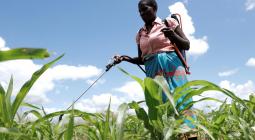ODD and innovation: African Artificial Intelligence Week in June in Lomé
Internet of Things (IoT), algorithm, machine learning, big data - the list goes on. Yet these complex expressions reflect the future of the world. A world where artificial intelligence, between its prowess and excesses, is pitting multinationals against each other, and dividing Western and Asian states over the urgent need for regulation. And what about Africa? The answer in June 2024, at the Artificial Intelligence Week (SIA) hosted by Togo.
Togo is preparing to host one of the biggest events of the year. The Artificial Intelligence Week (SIA) takes place from June 4 to 8, 2024 in Lomé, an ambitious city in perpetual construction. The event, closely scrutinized by President Faure Essozimna Gnassingbe, is co-organized with International Council on Artificial Intelligence (CONIIA), Human AI, a laboratory of ideas and solutions for Africa’s digital revolution, headed by entrepreneur Jérôme Ribeiro.
On the menu for the five-day event are exchanges between economic operators, political decision-makers and African and European researchers on the theme of “AI in Togo and Africa: state of play, opportunities and societal challenges”. Several start-ups and industrial platforms are also expected in the Togolese capital for technology demonstration workshops. This will be an opportunity to showcase the latest innovations in sectors dedicated to basic services (education, health, sanitation, etc.).
What does the future hold for artificial intelligence in Africa?
Several nations on the continent, and in particular the host country, which ranks 23rd in the Oxford Insights 2023 ranking of African territories “best prepared for AI”, have made it their hobbyhorse. If artificial intelligence is at the heart of global debates today, it’s because it is presented on the one hand as a threat to cyber-security (identity theft, disinformation) with consequences for diplomatic relations, but on the other hand as the key to accelerating the achievement of the Sustainable Development Goals (SDGs).
Indeed, AI combined with cartography can support municipalities in preventing natural disasters and anticipating their social and economic consequences. In agriculture, a sector trapped in West Africa between droughts and floods, the use of drones and sensors could improve the value chains of agri-businesses and even small-scale farmers. In this field, and even more so in the Internet of Things (remote control of homes, remote management of road traffic), Egypt and Morocco are regularly cited as examples. The participation of their representatives at SIA 2024 should enable considerable progress to be made on the training and regulatory aspects of AI in Africa.
Cover photo: By AFRIK21





